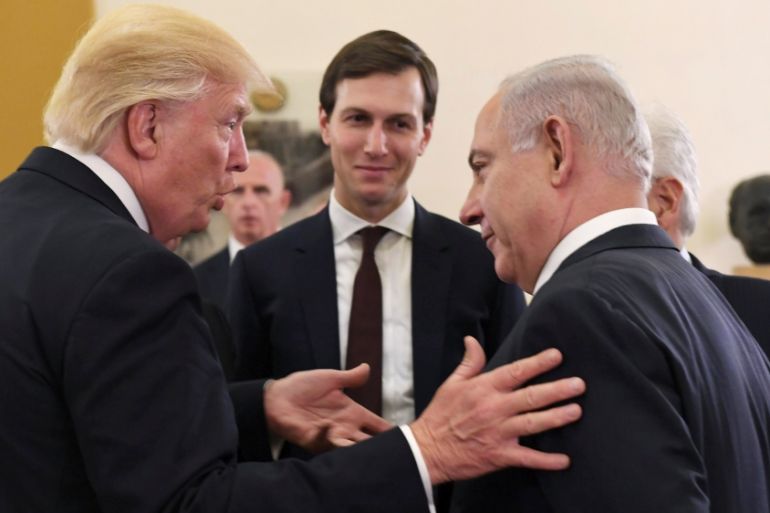Trump and the Palestinians: A timeline
From recognising Jerusalem as Israel’s capital to softening its position on settlements, a list of US moves under Trump.

The United States has said it no longer considers Israeli settlements in the occupied West Bank and East Jerusalem illegal.
US Secretary of State Mike Pompeo said on Monday his country will no longer abide by a 1978 State Department legal opinion that the settlements were “inconsistent with international law”.
Keep reading
list of 4 itemsSeven jurors seated on the second day of Trump’s New York hush-money trial
Six takeaways from first day of Trump’s New York hush money criminal trial
Day 1 of Donald Trump’s first criminal trial
“After carefully studying all sides of the legal debate, this administration agrees… (the) establishment of Israeli civilian settlements in the West Bank is not, per se, inconsistent with international law,” Pompeo said.
The move, which was immediately slammed by Palestinians and rights groups, is the latest in a series of US measures against the Palestinian people and their leadership.
It comes amid deteriorating ties between the two sides, especially following US President Donald Trump’s controversial recognition of Jerusalem as Israel’s capital and the relocation of its embassy there last year.
That decision drew universal condemnation from Arab leaders and criticism around the world, while Palestinian leaders, who see East Jerusalem as the capital of their future state, said the US was no longer an honest broker in negotiations.
Since Trump took office on January 20, 2017, Israel – a traditional US ally that receives military aid annually from Washington – has taken a series of measures that have been criticised as “racist” and “discriminatory” against the Palestinian people.
Trump is still expected to unveil details of what he has long referred to as the “deal of the century” to resolve the Israeli-Palestinian conflict. The unveiling of the plan has so far been delayed twice, with the US citing Israeli elections as the reason for the delay. The economic part of the agreement has already been rejected by the Palestinians.
Here is a timeline of key US decisions regarding Palestinians since Trump assumed office.
2017:
-
February 16: Trump drops the long-standing US commitment to a two-state solution, says he would back a single-state solution after meeting with Israeli Prime Minister Benjamin Netanyahu.
-
March 24: US Senate approves the appointment of David Friedman, a supporter and donor to illegal settlements on occupied Palestinian land, as Washington’s ambassador to Israel.
-
December 6: Trump announces a controversial decision to relocate US embassy from Tel Aviv to Jerusalem, formally recognises Jerusalem as Israel’s capital, breaking with decades of US policy.
2018:
-
January 3: Trump threatens to cut aid to the Palestinians in a series of Twitter posts, citing their unwillingness “to talk peace”.
-
January 17: US government cuts more than half its planned funding ($65m out of a $125m aid package) to UNRWA, the UN agency for Palestinian refugees that caters to more than five million registered refugees.
-
May 14: US embassy officially opens in Jerusalem on the same day Palestinians commemorate 70 years since the Nakba or “Catastrophe”, the ethnic cleansing of Palestinian cities and towns by Zionist paramilitaries in 1948 – also the eve of when the state of Israel was established.
-
August 19: Trump’s son-in-law Jared Kushner, who was tasked along with envoy Jason Greenblatt with reviving the stalled peace process in 2017, embarks on Middle East tour to build support for the yet-to-be-announced Israeli-Palestinian peace plan.
-
August 25: US cuts $200m economic aid to the Palestinians after it had planned to provide $251m for good governance, health, education and funding for civil society in the current 2018 budget.
- August 31: US State Department says it is stopping all funding to UNRWA after determining the organisation to be an “irredeemably flawed operation”.
-
September 9: US slashes one of its last remaining aid programmes ($25m in financial assistance) to a network of six hospitals in occupied East Jerusalem.
-
September 10: US closes the PLO mission to Washington, DC, over Palestinian Authority’s refusal to enter into US-led talks with Israel.
-
September 17: US revokes visas for the PLO envoy and his family in Washington, DC, causing them to leave the country.
-
September 17: US cuts $10m in aid for programmes on conflict resolution, designed to bring reconciliation for Palestinians in the West Bank and Gaza, as well as between Jewish and Palestinian citizens of Israel.
2019:
-
March 25: Trump recognises Israel’s 1981 annexation of the occupied Golan Heights, reversing decades of US’s policy.
-
June 20: US reveals proposal to create a $50bn global investment fund for the Palestinians and neighbouring Arab states, designed to be the economic engine of the US’s Middle East peace plan.
-
June 25: Bahrain hosts the Manama conference to discuss what the US described as the economic part of the long-delayed peace plan.
-
June 26: Jared Kushner, Trump’s adviser and son-in-law, urges Palestinian leaders, who boycotted and decried the US-led economic workshop in Bahrain, to think outside the “traditional box” as Manama conference closes.
-
November 18: US Secretary of State Mike Pompeo announces that the administration will no longer abide by a 1978 State Department legal opinion that Israeli settlements were inconsistent with international law.